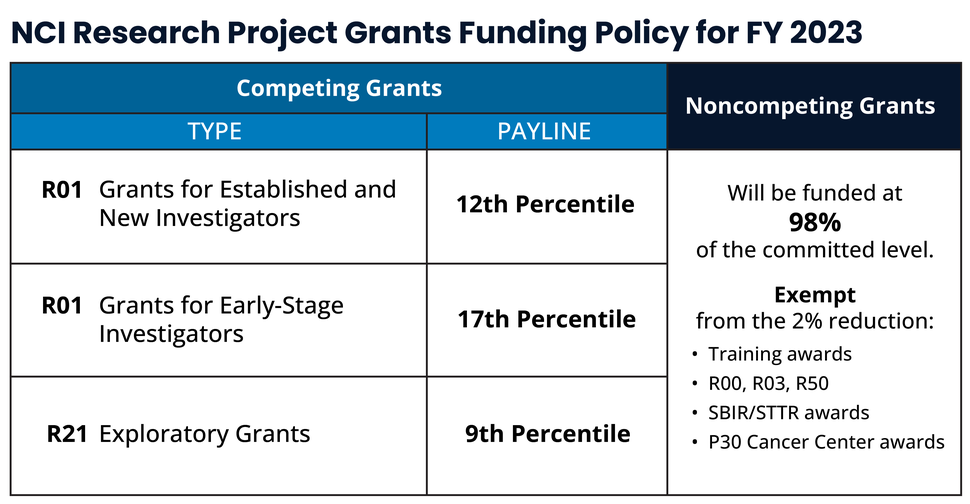NCI Funds More Research Grants Thanks to Action by Congress
, by NCI Director Dr. Monica Bertagnolli
In this edition, NCI Director Dr. Monica Bertagnolli discusses the opportunities created by NCI’s FY 2023 budget, including a $386 million increase, plus an additional $22 million for the Cancer Moonshot established by the 21st Century Cures Act of 2016. The generous support from Congress allows NCI to award more compelling cancer research and increase paylines for R01 and early-stage investigator grants.
On December 29, 2022, President Biden signed legislation that provided funding for NCI, NIH, and other federal government agencies through September 30, 2023.
In this legislation, Congress once again demonstrated its deep concern for people with cancer and strong commitment to the research NCI funds. The legislation signed by the President provides an NCI budget increase of $386 million for fiscal year (FY) 2023, plus an additional $22 million for the Cancer Moonshot established by the 21st Century Cures Act of 2016. Taken together, this is nearly a 6% increase—the second largest percentage increase for NCI in the past 10 years. The funding will allow NCI to award more compelling cancer research and to increase grant paylines for R01 grants, including early-stage investigator (ESI) R01s.
In October 2022, when NCI began the new fiscal year with temporary funding, we set interim grant paylines while we waited for final action on a full-year budget. With the passage of appropriations legislation in December, NCI now has a clear financial picture for the balance of the fiscal year and can set funding policies for our extramural research grants.
NCI Grant Funding Policies for FY 2023
Each fiscal year, NCI establishes paylines for competing grant applications, setting different paylines for different grant mechanisms, such as R01s and R21s. When applying a payline to the applications NCI receives, NCI awards funding to nearly all grant applications with peer-review scores better than or equal to the payline NCI establishes for a grant mechanism.
R01 grants, which are the most common type of research project grant, are highly competitive. Year after year, many of the most significant discoveries in cancer science emerge from R01 awards. In recent years, about two-thirds of the funding that NCI dedicated to competing grants paid for R01 awards.
The December funding increase from Congress allows NCI to raise the R01 payline to the 12th percentile, compared with the 11th percentile in FY 2022. This action continues the sustained NCI payline increases since FY 2019, when the NCI R01 payline was the 8th percentile. We are also making a parallel payline increase for ESIs to the 17th percentile, a 1-percentile increase from FY 2022. NCI will maintain the payline for R21 Exploratory/Developmental Research Grants at the 9th percentile.
Our grants policy for ESIs reflects NCI’s commitment to developing and supporting researchers in the early stages of their careers. This helps ensure that we build and sustain the next generation of talented cancer researchers. With this goal in mind, during FY 2023, NCI will continue to convert the most meritorious R01 applications from ESIs into R37 Method to Extend Research in Time (MERIT) Awards. R37 awards can provide an additional 2 years of research funding beyond the initial award period.
Even with these payline increases, during FY 2023 NCI will receive many meritorious research applications that won’t be funded. We are committed as fully as possible to increasing the number of research applications NCI funds—research that will fuel broad, sustained progress to meet the needs of people with cancer and those at risk of cancer. Our goal is to continue to expand the support that sustains a robust cancer research workforce, gives us a deeper understanding of cancer biology, and leads to new strategies to prevent, screen for, diagnose, and treat cancer in all its forms.
Maintaining the remarkable pace of progress in cancer research over the past few decades requires sustained funding for sufficient years to allow researchers to test their hypotheses in an environment that fosters scientific creativity. That is why most R01 grants are funded for 5 years and ESI R01s that convert to R37 MERIT Awards have a 7-year grant period.
Noncompeting Grants at 98%
It’s important to stress, however, that these multiyear commitments, when added to grant commitments from prior years, have significant budget implications. So, despite receiving a generous budget increase from Congress, NCI still faces some difficult choices.
The FY 2023 payline increases will fund more than 100 additional R01 and ESI awards than last year. However, making these commitments to new, competing grants, while also managing rising operating costs in an era of dramatically higher inflation, means that we must find cost savings. Therefore, like last year, NCI will pay most continuing, noncompeting grants—that is, years 2 through 5 of a typical 5-year grant—at 98%.
The following table displays details of the most prominent NCI funding policies for FY 2023 grants. Further details are available on our website.
NCI is also making cuts to internal budgets. We are imposing a 2% cut to the programs of NCI divisions, offices, and centers. These cuts allow NCI to prioritize funding for R01 and ESI competing grants.
As NCI implements these grant paylines, it’s helpful to appreciate the recent history of NCI budgets and grant funding. Since FY 2019, Congress has increased NCI’s total budget by 19%. During the same period, in keeping with our deep commitment to expanding the grants portfolio, NCI increased the pool of funding for competing grants by 32%. This demonstrates NCI’s deep commitment to expanding the portfolio of grants for cancer research.
Thanks to decades of strong investment in biomedical research, we are in an era of great progress and remarkable opportunity to speed discovery and deliver results to those diagnosed with cancer, those at risk of cancer, and the growing population of cancer survivors. This progress has only been possible because of all you do, every day, for those who benefit from your research and clinical care.
The bottom line: Generous support from Congress allows NCI to raise paylines for R01 and ESI grants. As a result, in FY 2023, NCI expects to issue more than 100 additional R01 and ESI awards than last year.

